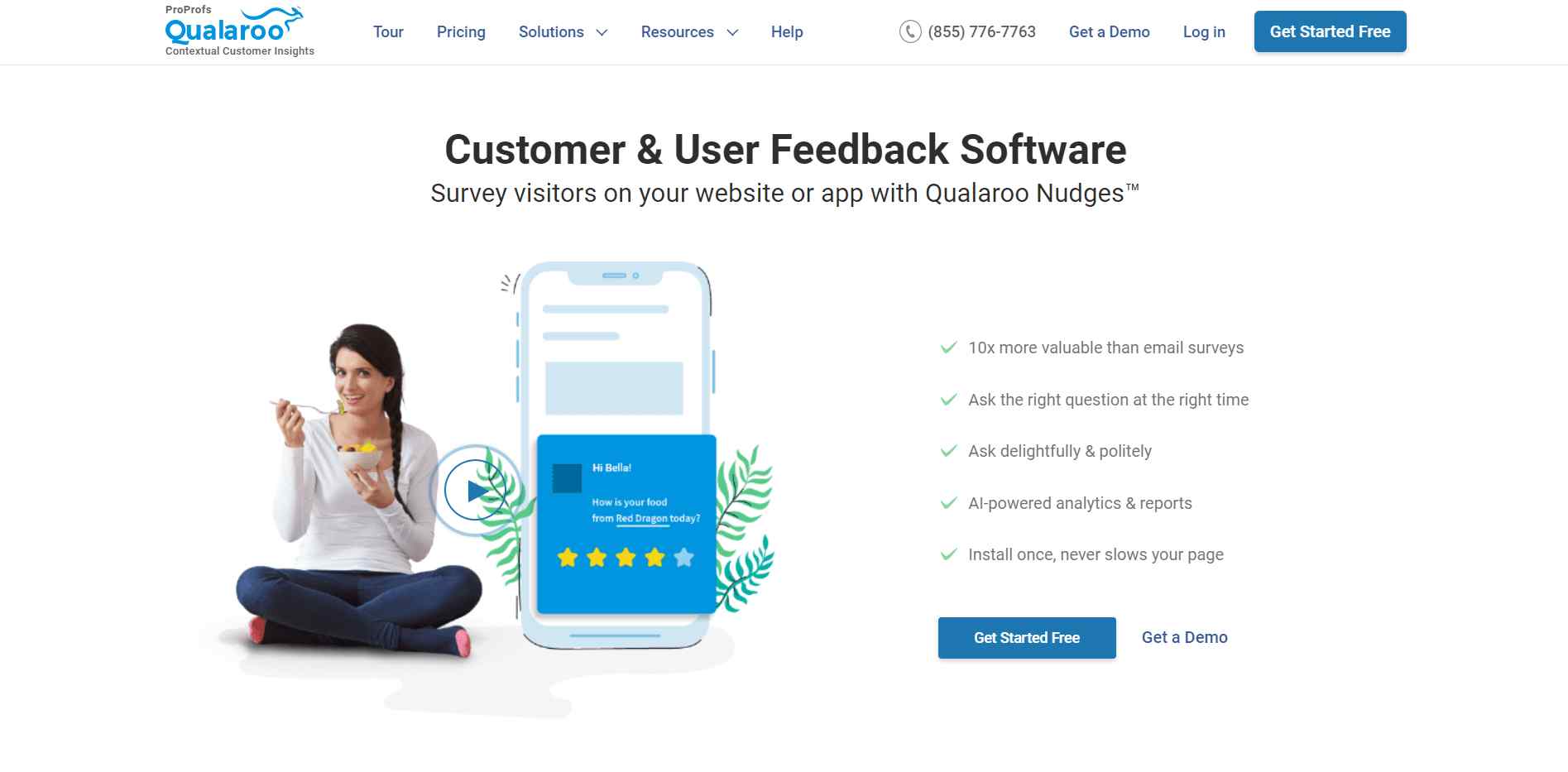For many software-as-a-service (SaaS) companies, the homepage is a major contributor to closing sales. It must demonstrate your value, stand out from the pack and ultimately convert prospects into customers. That being said, homepage copy is arguably the most important factor in any SaaS website. To help you put your best foot forward, we’re sharing six strategies for optimizing web copy that your SaaS business should consider.
1. Start with Search Terms and Work Backwards
Most authors will tell you that before writing a novel, you have to know who your audience is. The same holds true for web copy. Understanding the personas you are selling to will be key to finding words and phrases that resonate with that audience. From there, you can determine if your website is likely to capture them with your anticipated search terms.
One tool that we find helpful at Qualaroo is the Hubspot Content Strategy module. This powerful tool allows you to better understand the kinds of content and phrases that you rank for as well how relevant your domain is for those phrases. Hubspot Content Strategy goes a step further to identify subtopics or to cluster content, which can help support your domain’s authority and may get picked up on long-tail searches.

The main objective here is to better understand how you rank for the terms most important to your business. If your site is performing well, you have the ability to leverage that relevancy by creating supporting content. If not, you may need to go back to the drawing board and make sure the language on your website supports the search terms your prospects are using discover you.
2. Use the Is/Does/Means Model
A consumer just landed on your page, and the clock is ticking. They’re looking for any reason to bounce, so it’s imperative to adopt the Is/Does/Means model for your copy, where you’ll quickly identify the following:
- What your product is. Don’t beat around the bush. Get your value proposition down to a pithy phrase. For example: “Qualaroo is a SaaS product that helps companies capture qualitative insights that matter.”
- What your product does. So how does your SaaS product actually do it? Immediately follow what your product is with what it does. For example: “Qualaroo targets the right person with the right question at the right moment in time whether it’s on your website, mobile app, or more.”
- What does your product mean for the customer? Too often this piece is left out. SaaS companies are content with just stating what their product is and does, but explaining what it means for your prospect is key to demonstrating value. This is the phrase that’s going to get them to stay on site and gather more information. For Qualaroo customers, our product means that they better understand why decisions are being made about their brand, product or service.

How Qualaroo uses the Is/Does/Means content model.
On our more targeted landing pages, we take this tactic a few steps further by describing this value in terms of specific KPIs or industry metrics. For example, we have a content download page targeted toward eComm companies at https://ecomm.qualaroo.com/.
In it, we contextualize what Qualaroo does in the mind of an eComm reader by referencing topically relevant questions they might have, like the reason behind shopping cart abandonment rates or how to survey users regarding exit intent.

As you develop the copy that answers what your product is, does and means, it’s important that you research what your competitors are saying. Draw contrasts to illustrate what makes your SaaS product unique and better—your consumers are making comparisons between your services, so help them make their decision.
3. Specifically Address Different Personas
Some SaaS products and services are applicable to a number of different personas. In this case, it’s crucial to speak in the terms and jargon unique to each of them. One company that does a great job of this is Twilio, a Qualaroo customer.
A provider of the backend technology that helps businesses engage with customers, Twilio effectively appeals to personas within different verticals. Front and center on their homepage are photos of customers from a variety of industries, including the hyper growth-oriented Uber and a health-care company called Doctor on Demand.

Learn more about how Twilio uses Qualaroo to help identify customer problems in our case study.
The copy adjacent to each photo contextualizes the customer’s work. This provides an invitation for a prospect to click further into the site and gather information that’s most relevant to them.
By highlighting customers from different industries, Twilio is able to appeal to a variety of different personas.
4. Provide Social Proof
Just as no one likes to go to an empty restaurant, prospects want to make sure that they’re not the only ones using your software. One way to allay those concerns is to have a list of current customers on your homepage.

Mailgun shows off some big names in tech that use their email service for developers.
Not only will this demonstrate that you’re a viable business, it will also give your prospective customer ammo for making their business case to their boss—bonus points if you can link your top client logos to related case studies for further proof.
FREE. All Features. FOREVER!
Try our Forever FREE account with all premium features!
5. Constantly Test
When optimizing web copy, one or two little words can make a huge difference when it comes to conversion rates. So if you think your website’s prose is perfect, you might be mistaken.
A/B testing is a must in today’s digital world. In fact, these areas are most ripe for testing:
- Headlines and value propositions
- Top landing pages
- Lead pages
- Checkout pages
- Advertising campaign landing pages
6. Ask Your Users What They Think
Finally, if you really want to know whether your SaaS web copy is compelling, just ask your users. A user feedback tool like Qualaroo can help you identify which copy is clunky and which is captivating. Consider segmenting out your audience between customers and prospects to see if there are any differences. While your fans may be accustomed to your writing, prospects might find it a little grating.
Bonus Read: SaaS Marketing Strategies : Techniques to Grow Your Business
Your Turn
What strategies do you have for writing compelling web copy for an online SaaS product? Who do you think does this the best? Be sure to let us know in the comments—we love to get user feedback and ideas!
FREE. All Features. FOREVER!
Try our Forever FREE account with all premium features!

 We'd love your feedback!
We'd love your feedback! Thanks for your feedback!
Thanks for your feedback!






